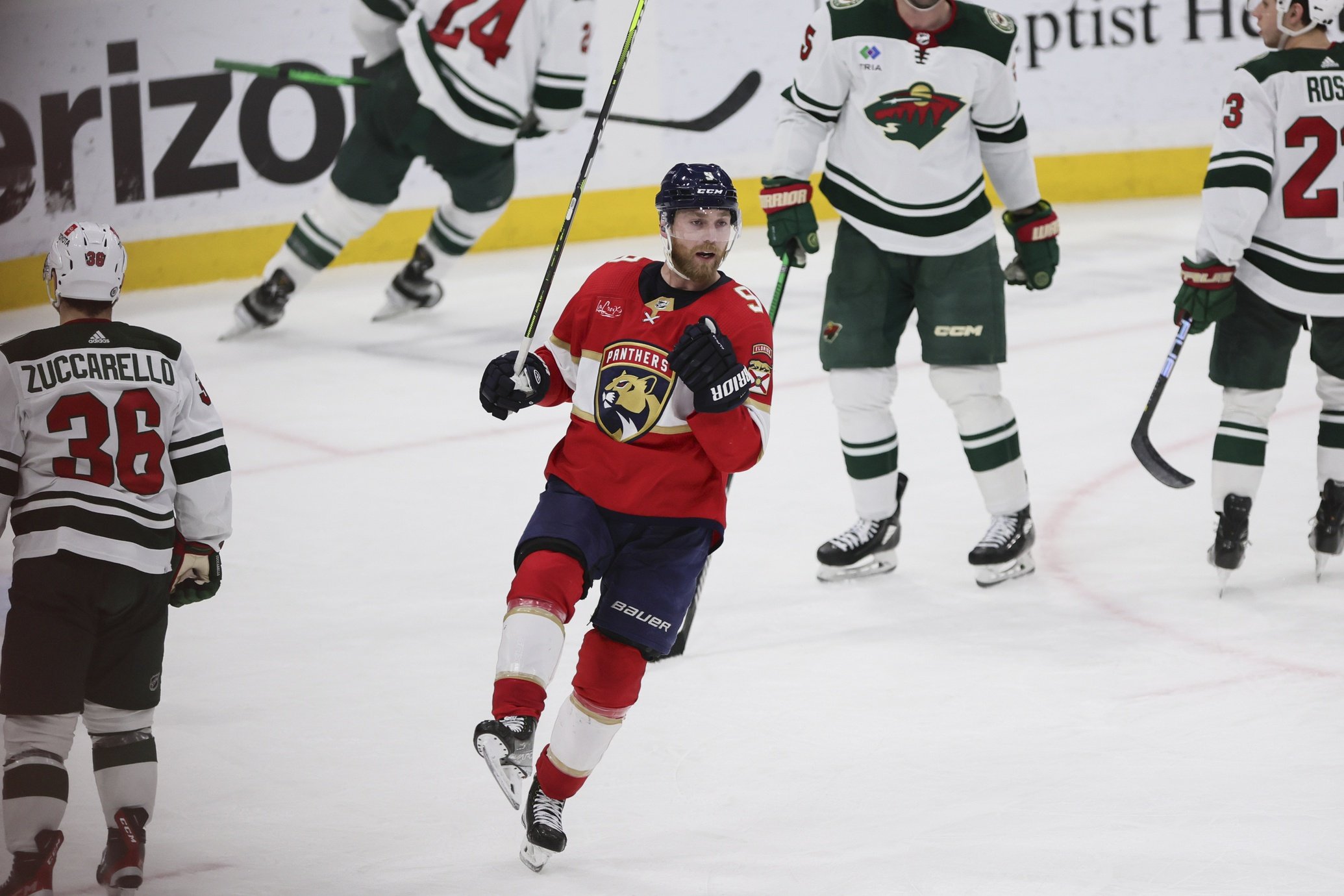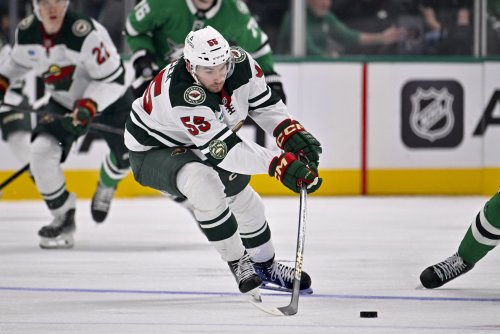
Former Blockbuster magnate Wayne Huizenga brought hockey to South Florida in 1993 as the first owner of the expansion Florida Panthers. He initially wanted to call them the Block Busters.
Instead, they adapted Netflix colors and outlasted Huizenga’s video rental chain.
The Panthers were almost the Vegas Golden Knights of the ’90s. They outsmarted their competition in the expansion draft and reached the Stanley Cup Final in 1996.
“They used to refer to themselves as castoffs,” said Michael Russo, who covered the Panthers before becoming a Minnesota Wild beat writer. “The Panthers essentially drafted the core for their Cup run through that expansion draft and then they made a lot of shrewd moves behind the scenes to gobble up draft picks.”
The Quebec Nordiques relocated after the 1995 season, became the Colorado Avalanche, and swept the Panthers in the 1996 Stanley Cup Finals. It was the beginning of an Avs dynasty. They made the playoffs during their first ten seasons and won the Cup again in 2000-01.
However, Florida made the playoffs twice in the next four years, then went ten seasons without making the postseason from 2000-01 to 2010-11. However, the Panthers reached the Stanley Cup Final three years ago and became repeat champions this year.
They are the first back-to-back Stanley Cup champions since the Tampa Bay Lightning won in 2020 and 2021, meaning four of the past six Cup winners have come from Florida. Meanwhile, Canada hasn’t won a Stanley Cup since the Montreal Canadiens beat the Los Angeles Kings in 1994.
The 1996 Stanley Cup Finals symbolized the NHL’s shift from traditional hockey markets to larger American cities. The Edmonton Oilers had traded Wayne Gretzky to the Los Angeles Kings in 1988, signaling hockey’s tectonic shift from smaller northern markets to large, warm-weather cities.
In the 1990s, the NHL left hockey-crazy locals to chase corporate dollars and cable money with relocations and expansion teams. The league said goodbye to Winnipeg, Quebec City, and Minnesota, opting for Sun Belt cities like Dallas, Atlanta, and Phoenix. Dallas-Ft. Worth is the fifth-largest American TV market. Atlanta is the eighth-largest; Phoenix, the 12th.
Some of the Sun Belt teams thrived. The Tampa Bay Lightning have won three Stanley Cups, including back-to-back championships in 2020 and 2021, and the Anaheim Ducks and Carolina Hurricanes have won the Stanley Cup. The San Jose Sharks had 90-plus points in every season from 2000-01 to 2018-19, except for two.
However, the Sun Belt teams’ success came at the expense of the Canadian clubs. Tampa beat the Calgary Flames in 2004. The Hurricanes beat Edmonton after the 2005 lockout, and Anaheim beat the Ottawa Senators in 2007.
Canada hasn’t won a championship since the Montreal Canadiens beat Gretzky’s Kings in 1994. The Toronto Maple Leafs haven’t won one since 1967, and the Vancouver Canucks haven’t ever won. The Canucks fans nearly burned down their city when the Boston Bruins beat them in 2011.
Still, it’s not as though the league’s longstanding teams haven’t won the Stanley Cup recently. From 2008 to 2019, the Chicago Blackhawks won three, and the Pittsburgh Penguins and the Los Angeles Kings won two. The other teams were the Original 6 or 1967 expansion teams: the Bruins, Detroit Red Wings, Washington Capitals, and the St. Louis Blues.
However, a Florida-based team has won the Stanley Cup in four of the past six years. Meanwhile, the Avs and Vegas Golden Knights have won the other two.
There’s nothing inherently wrong with Sun Belt teams winning hockey championships. Their success has expanded the game to new areas. However, it’s come at the expense of better-supported teams, and the cable bundle is coming undone.
To survive in the streaming era, the NHL must ensure that the league’s most supported teams have an advantage. The teams in Atlanta and Phoenix have relocated to Winnipeg and Utah, and The Athletic doesn’t have beat writers for the Panthers and Knights because there aren’t enough people to pay for day-to-day coverage. That’s not the case for the teams in Canada, the East Coast, and the Midwest.
That doesn’t mean the league shouldn’t have teams in large, sunny cities. However, sports teams make most of their money from season-ticket holders and television revenue. The league must allow the teams with the most support to leverage their financial might to have an advantage. Otherwise, it risks losing fans in cities with the most support while advantaging the Sun Belt teams with a tight salary cap.
As the cable bundle comes undone, teams must sell individual subscriptions akin to Twins.TV and similar services, then package those subscriptions to Apple or Amazon to replicate the cable bundle. People in San Jose, Tampa, and Sunrise will buy them. However, there are more hockey fans in Toronto, Boston, and Chicago.
The league must raise the cap ceiling and lower the floor to allow the teams with the most support to leverage their financial advantage, within reason, while allowing the lesser-supported teams to operate on a budget in losing seasons.
That will mean teams in Canada, the Northeast, and the Midwest will have an advantage. Still, so will the well-supported Sun Belt teams. Florida may continue to win championships because they have a savvy front office. Conversely, the Calgary Flames must manage their team better to return to the playoffs.
However, this new model will give teams like Toronto, Montreal, and Boston an advantage over many Sun Belt teams. It will allow the most supported teams to succeed, with the tacit understanding that some Sun Belt expansion teams may fail. Fortunately, the league could move those teams to Hamilton, Ont., or Quebec City, putting a second team in the Greater Toronto Area or near Montreal.
A financial model built around the most supported teams would help the Minnesota Wild. However, it might not help as much as big-market teams like the Chicago Blackhawks, New York Rangers, or the Philadelphia Flyers. People here fill the Xcel Energy Center and would buy TV subscriptions, but they might not at the rate of fans in the bigger cities.
Regardless, the only positive takeaway from the league punishing the Wild for the Zach Parise and Ryan Suter contracts is that it indicates ownership is willing to spend on the team. Detroit, Vancouver, and the New Jersey Devils also suffered cap circumvention penalties, meaning ownership in those markets was willing to spend more than the league would allow.
To survive as the cable bundle comes undone, the league must allow teams willing to spend to spend within reason. Nobody wants a 1990s Penguins situation, and the NHL shouldn’t let Toronto and the Rangers become the New York Yankees and Los Angeles Dodgers. Still, the league must let teams like Detroit, Vancouver, and Minnesota leverage their financial might to survive in a post-cable world.
Think you could write a story like this? Hockey Wilderness wants you to develop your voice, find an audience, and we'll pay you to do it. Just fill out this form.
-
 1
1





.thumb.jpg.acd5dedd7251543624c6b47bfa6a1212.jpg)

Recommended Comments
Join the conversation
You can post now and register later. If you have an account, sign in now to post with your account.
Note: Your post will require moderator approval before it will be visible.